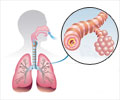The H3N2 vaccine in circulation is only 20-30% effective because, it may not be effective against the mutations of the virus that causes flu.

‘Influenza virus antigens grown in systems other than eggs are more likely to elicit protective antibody responses against H3N2 viruses that are currently circulating.’





Scott Hensley, PhD, an associate professor of Microbiology, in the Perelman School of Medicine at the University of Pennsylvania, describes his team's findings in the Proceedings of the National Academy of Sciences. "Our experiments suggest that influenza virus antigens grown in systems other than eggs are more likely to elicit protective antibody responses against H3N2 viruses that are currently circulating," Hensley said.
"The 2017 vaccine that people are getting now has the same H3N2 strain as the 2016 vaccine, so this could be another difficult year if this season is dominated by H3N2 viruses again."
Flu vaccines work by priming the immune system with purified proteins from the outer layer of killed flu viruses. This induces immune cells to make antibodies that stop foreign invaders from infecting cells, readying them to attack flu viruses when the body sees them again.
Most flu vaccine proteins are purified from a virus grown in chicken eggs, although a small fraction of flu vaccine proteins are produced in systems that do not involve eggs.
Advertisement
"Current H3N2 viruses do not grow well in chicken eggs, and it is impossible to grow these viruses in eggs without adaptive mutations," Hensley said.
Advertisement
"Our data suggest that we should invest in new technologies that allow us to ramp up production of influenza vaccines that are not reliant on eggs," Hensley said.
"In the meantime, everyone should continue to get their annual flu vaccine. Some protection against H3N2 viruses is better than nothing and other components of the vaccine, like H1N1 and influenza B, will likely provide excellent protection this year."
Source-Eurekalert















